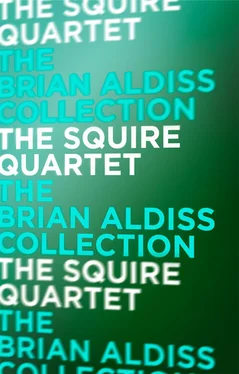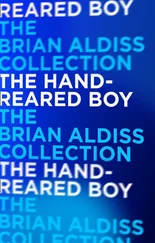BRIAN ALDISS
The Squire Quartet
Life in the West
Forgotten Life
Remembrance Day
Somewhere East of Life
Part of the Brian Aldiss Collection
Cover
Title Page
Introduction
Life in the West
Forgotten Life
Remembrance Day
Somewhere East of Life
About the Author
Copyright
About the Publisher
Introduction
The Squire Quartet
Originally, these four novels had a curiously remote relationship. Their writing was scattered over fifteen years; I wrote other books in between. I also spent much time putting together anthologies of other writers whose stories I admired and felt they deserved a wider audience.
The scenes are set here and there, concluding mainly in two countries, Georgia and Turkmenistan.
Georgia I had visited, and felt I knew pretty well. At the time, I had a researcher, who dug into the Great Soviet Encyclopaedia. She discovered that Turkmenistan had at its heart the image of a poet, Makhtumkuli. It was as if the column in London's Trafalgar Square had at its summit not Nelson but Philip Larkin!
My curiosity was awakened. I had the good fortune to find in the city of Reading the jovial Dr Youssef Azimun, who had once been Minister for Culture in the Turkmen government. I also found that his wife was a wonderful cook. In no time, I accompanied Youssef to Ashkhabad.
During that period, I was having problems with my literary agent. He worked in London, I in Oxford – thus I had little opportunity to strangle him. This perhaps explains why the four Quartet volumes, in England at least, were published successively by four different publishers. They were for that reason never considered, never weighed up, as a Quartet. Yet they strive together to embrace the world in which we then lived.
It is clear that the four books cover a lot of ground and time and tone; such was my life then that this was partly by design, partly inadvertence.
I did come to regret that Tom Squire did not play a greater role in the later volumes; possibly I felt this to be an echo of my own career.
Eventually, I made what must pass for amends. In a volume I wrote later, which deals with the EU forty years on (entitled 'Super State'), there is a passage where, on a sad and rainy day, Squire's body is buried, his coffin choked with wreaths and flowers. A reception is held afterwards in Pippet Hall.
Squire was a good liberal man. Maybe I underestimated him.
BRIAN ALDISS
Life in the West
Life in the West is dedicated to other
Distinguished Persons
Chen, David, Iris, Maysie, and Michael
by no means forgetting Felix, Elena, Derek, and Janet
to show them what one of their number was up to
before we sampled life in the East
and walked the Great Wall together
Title Page
Dedication
Introduction
Prelude
1 The International Congress
2 Flattery and Higher Foolishness
3 A View from the Beach
4 Conversation with ‘Drina’s’
5 She’s Only a Sex Symbol
6 Putting our Socialist Friends to Rights
7 Land Full of Strange Gods
8 Sublimated Coin Warfare
9 How to Get to Ostrow Lomelsky
10 Slatko
11 ‘The Strong Act as They Have Power to Act’
12 Tribal Customs
13 Illegal Currency Charges
14 An Ideological Decision
Acknowledgments
I walked beside a sea aflame,
An animal of land. The fire
Of stars knocked at my earthbound frame:
East of grapples West, man maid, hope Fate;
All oppositions emanate
From constellations of desire.
Burning below hair, flesh, and teeth,
An image of the Bright Ones lies,
A lantern hid in bone. Beneath
That vision, teeth and hair begin
Again; wolf grins to wolfish grin
As smile I in my lover’s eyes.
Too soon that love with false-bright hair
Is dead: the house stands silent. I
Fare forth across the world’s despair,
Its muteness, oratory, and banners,
To seek not truth but modern manners.
The head must win what heart let die.
When I began to write the Squire Quartet my intention was to portray something of the world I was living in, from the 1980s onwards. I found most of that world exciting – enticing to experience and to record.
This, the first volume of the Squire Quartet, brisk and chatty, was published on March 6th 1980 – as a loving card from my wife, still tucked into her copy of the book, reminds me. We were living on a quiet North Oxford street and our younger children were seriously into education. We were always moving house, depending on our fortunes.
I had been attending a conference in Palermo – a conference with a strong Communist flavour, not particularly enjoyable. It was over. I was standing on the dockside, looking north over the sea. A story began to build up in my mind: the conference; the players from various countries, where the economic blocs seemed irreconcilable; and at the same time, a man’s – Sir Thomas C. Squire’s – difficulties at home.
Once I returned to our house in Charlbury Road, I launched into the novel. My mother died during that period; a melancholy event recorded when Squire’s mother dies just before Christmas. You have to go on, whatever happens. Maybe the army taught me that. Or maybe I had known it even as a small boy. Anyhow, Squire also has to press on. Trouble in Yugoslavia, where he is almost killed. Separation from Teresa, his wife. More human experience, more meditation. More striving to penetrate the thickets.
The novel opens with Squire in Ermalpa, Sicily, for a conference on the popular arts, dubbed ‘the arts of no refinement’. He claims that the pop art of one generation becomes the classic of the next: ‘Homer was, in his day, the Bronze Age equivalent of the TV soap opera.’ Squire is for the new, insisting we rise up to change.
Later, back at his Norfolk house, Pippet Hall, Squire is filming and being filmed. The traditional pretty girl in a swimsuit is with him. He remarks, ‘We are all symbols to each other as well as real people.’
It is the period of the Cold War – much discussion takes place. Squire and his wife quarrel bitterly.
Squire recalls a note given to him in Ermalpa, in which Vasili Rugorsky, the friendly Russian, proposes they visit Nontreale’s cathedral and that Squire pay the bus fare: ‘our government keeps us poor as saints.’
They get to Nontreale and enter the cathedral. Rugorsky praises the elaborate artwork. He says to the unimpressed Squire, ‘Without God, I can see no meaning in anything.’
‘Do you ever experience the feeling that you have come to a dead halt in your life?’ Rugorsky asks.
So the questioning goes on, the faltering marriage, the symbols, the seasons, life itself …
Brian Aldiss
Oxford, 2012
Spring 1977
A period in the history of the West known as the late nineteen-seventies. One of the milder inter-glacial periods, when textbooks describe the North European climate as ‘pleasantly cool and damp’.
Over the European Economic Community, eight o’clock of a windy and rather chill spring evening. Television screens brighten everywhere, in flats, houses, and apartments stretching from Scapa Flow to the Gulf of Otranto. Hundreds of them, thousands, millions, the characteristic burning to ward off the terrors of ancient night. So characteristic that future historians will refer to this cultural epoch as the Rounded Rectangular. The global village enjoys its nightly catharsis of violence or Kultur.
Читать дальше












